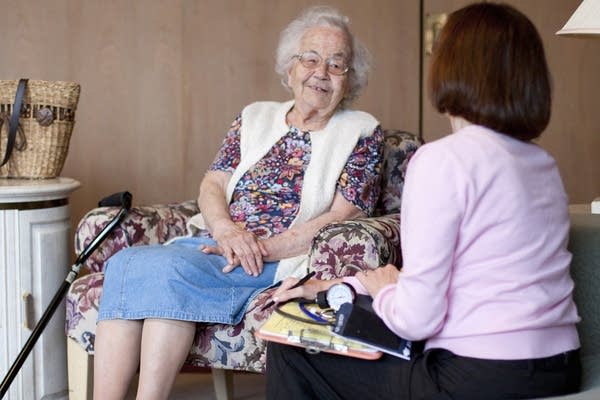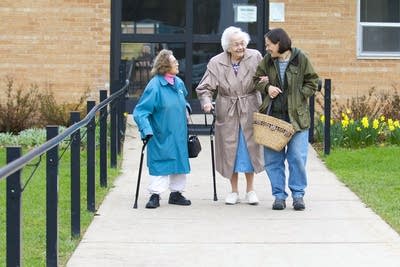Senior citizen transit facing cuts as needs increase

Every Thursday, volunteer Zan Ceeley gives Delores Alvous and Martha Marlowe, both seniors, a ride to a nearby church.
They have a cup of coffee, get their blood pressure checked and chat with about two dozen others who show up at the weekly health clinic organized by Nokomis Healthy Seniors, a south Minneapolis nonprofit.
Alvous, 82, quit driving a couple years ago. The south Minneapolis resident has children who live nearby, and a couple can help with transportation.

"One is in the suburbs, one is in north Minneapolis, and the one that's closest to me doesn't have a car right now anyway," said Alvous.
Create a More Connected Minnesota
MPR News is your trusted resource for the news you need. With your support, MPR News brings accessible, courageous journalism and authentic conversation to everyone - free of paywalls and barriers. Your gift makes a difference.
Alvous lives near a Metro Transit bus stop. But she uses a cane so even a short walk is a strain, and getting to the bus stop is not an option especially on snow- and ice-covered sidewalks in winter. She on a fixed income, and can't afford cab rides.
Marlowe and Alvous are just a few of thousands of elderly Twin Cities residents who routinely rely on others to get around. Yet the availability of that transportation is changing.
The changes come amid growing demand for transportation help from older residents, and as funding for the services appears headed for cuts.
For Alvous, the best transportation option aside from family is the Nokomis Healthy Seniors' collection of volunteer drivers, who aren't paid for their time or expenses.
"A STATE OF CRISIS"
Twin Cities nonprofits who serve older residents report more requests for transportation help.
One reason may be the Metropolitan Council's changes to its dial-a-ride service, a major source of affordable transportation for older residents.
A reorganization last year means dial-a-ride is now available in the entire seven-county region, including rural areas.
But to do that the Met Council pulled some of its funding to smaller dial-a-ride operations in cities and suburbs.
Arlene McCarthy, Met Council's transportation services director, said some of the service was in areas already served by Metro Mobility and Metro Transit buses.
"We needed to get away from duplicating services, having them overlay, and in essence, competing with ourselves," said McCarthy.

This is the first full year of the Met Council's reorganized dial-a-ride operation called Transit Link, and, not unexpectedly, ridership numbers are down as riders adjust to the changes.
McCarthy said it's possible some of the riders are now using Metro Transit buses and trains or Metro Mobility.
In any case, other nonprofit transportation services are scrambling to keep up with rising demand.
Courtney Whited, the transportation director for PRISM, a Golden Valley nonprofit social services organization, said agencies like her's are trying to fill the gap.
"I would say senior transportation services in the Twin Cities are in a state of crisis," said Whited. "They left about a dozen programs without sufficient funding so they closed in the last two years."
MORE SENIORS LIKELY TO NEED TRANSIT
The number of older Twin Cities residents seeking transportation help is likely to increase.
In the suburb of Roseville, for example, the new Census numbers show more than a fifth of the population is 65 or older.
Census statistics also show Twin Cities residents age 85 and older increased by more than a third over the past decade.
Janell Wampler, director of the Roseville-area senior program, said many people are used to the independence of our car culture.

"We're really on the horizon of a demand for increased service," said Wampler. "In this area it was built on the road concept, there are not as many sidewalks ... and we have a very large population of older adults and the baby boomers are getting older too."
Funding for the Met Council's dial-a-ride service is a blend of federal, state and local money.
The Met Council's contribution to the seven-county dial-a-ride service is $5.6 million. Metro Mobility, the service for disabled riders, costs about $41 million.
The GOP-led House and Senate are proposing cuts of more than $100 million for all transit services in the state over the next two years.
Met Council officials say the cuts would lead to transit fare increases and service reductions.
